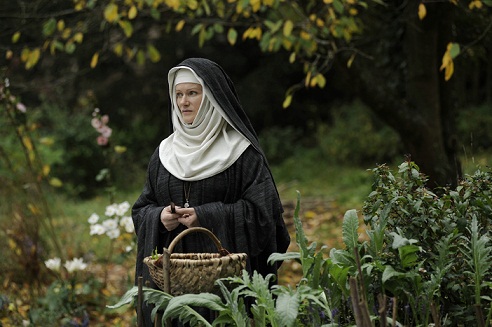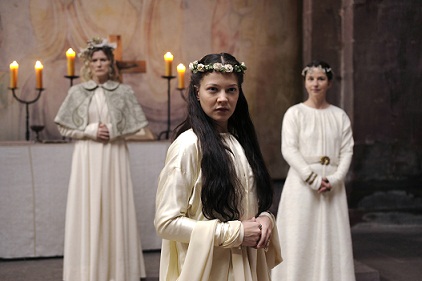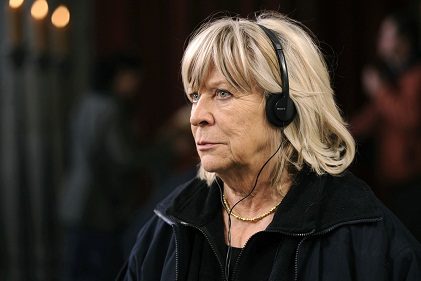
German writer-director Margarethe von Trotta started directing movies in the 1970s at a time when there were few women behind the cameras. Not only is she still making films, but she's now recognized as one of the leaders of the German New Wave along with filmmakers like Rainer Werner Fasbinder (Lola, Berlin Alexanderplatz) and Volker Schlöndorf (The Tin Drum), who was once her co-director and husband.
The label of "feminist" filmmaker seems far too limiting to describe her career and the content of her films. Her movies have examined terrorism (The Lost Honor of Katharina Blum, Marianne and Juliane), the effect of the Cold War on Germany (The Promise), the complexity of human relationships (Sisters, or the Balance of Happiness) and the life and work of German revolutionary Rosa Luxemburg.

Her latest movie Vision: From the Life of Hildegard von Bingen has been in her mind since 1983. The film opened last Wednesday in New York and is set to play in Los Angeles and the rest of the country shortly. The film stars frequent von Trotta collaborator Barbara Sukowa, who also played Luxemburg.
Hildegard von Bingen seems a perfect subject for one of von Trotta's films. The 12th century nun was an accomplished medical botanist, composer, playwright, religious writer and confidant of heads of state. Like von Trotta, she excelled in areas where women had been forbidden.
Contacted by phone from New York, von Trotta explained how much we still have to learn from a woman who lived centuries ago.
Dan Lybarger: With Rosa Luxemburg, you went back 100 years in the past. With Vision, you've gone back 1,000 years. Which was more difficult?
Margarethe von Trotta: (laughs) I don't know. I think I was more afraid with Rosa Luxemburg when I wrote the script. I was in such a panic because I put in two years to write the script, to make research, to know it all.
Because she was so near, you couldn't invent (anything). You always have to invent as a filmmaker. You never find everything documented. If you don't want to make a film only out of speeches and political writings and so forth, you have to dig to get to the soul or the flesh of somebody. That, you always have to do.
Because I felt more responsible to Rosa, she was still in our mind. And she was still in our recent history. From nowadays, I went back 100 years, but when I did the film it was '85, and she was murdered in 1919. So it was not so far.
And 1,000 years, that's a big jump. True, I was also afraid. I'm always afraid when I'm making films. I'm never really totally sure. I think that is part of the creation game that you never know before if you can succeed or not.
But there was much less documentary stuff for Hildegard than there was for Rosa. When I did Rosa, I even met two people who knew her. At the time I met them, they were already over 90. They were still there to speak about her.
I had nuns from the Hildegard monastery in Germany, and they are still very connected in their ideas and their spiritual knowledge. You never know how much is in the minds of the people and how much is really the truth.
Yes, but was it tough to deal with her on something more than an iconic level?
You've seen the film, so you've got the feeling that it's not an icon. She's a woman who is near to us.
I noticed, for example, that she gets jealous over (fellow nun) Richardis' promotion.
She becomes a very normal, jealous, deeply feeling woman. No? And that was very important for me because that is all documented. There's a whole volume of letters that she wrote and that she got. They are still there. She wrote also to Barbarossa, who became the emperor. She wrote to the Pope.
She wrote to several popes because she was a long-living woman. I stopped the film when she was 60, but she became 81. And that was enormous at this time because normally people died at 35, maximum 40. So, she survived several popes (laughs).
She had this correspondence at the moment when Richardis was taken away from her. She was so upset and so humiliated and also so deeply, deeply (vulnerable) that she wrote to the mother, to the brother, to the abbot, to the Archbishop, even to Pope. You imagine she wrote to the Pope to get the woman back. So she became for me a really, really normal woman.
That relationship is similar to the one depicted in your earlier movie Sisters, or the Balance of Happiness (1979). Both Vision and Sisters feature characters who try to manipulate other into becoming what they want them to be. Hildegard tries to make Richardis act more like a proper Benedictine nun.
(laughs) That's true. I didn't recognize it because Sisters is so far away now. It's one of my earlier films. It was the second film I did on my own.
Both movies reminded me of Vertigo, where Jimmy Stewart tries to make Kim Novak into the dead woman he loved.
Vertigo is my absolute favorite film of (Alfred) Hitchcock. My masters are (Ingmar) Berman on one side and Hitchcock. Hitchcock, you wouldn't see it in my films, but Bergman, you could see a little bit more that he was an example or icon for me, because we spoke of icons before. Vertigo is just the film I like most.
I saw it together with Berman films in the very beginning of my passion for cinema, when I was in Paris. I started in Paris, and I discovered cinema with the films of Bergman. The first film I saw was The Seventh Seal. It's another medieval film if you want (laughs), and then others sure. And I saw a lot of the films Hitchcock did until the early 60s. Vertigo is my favorite, so perhaps I'm unconsciously influenced by him.
When you see my other films, Marianne and Juliane and Sheer Madness, it's always this theme: that there are two people who are being one. They could be one because they are two sides of the same character. Also with Maria and Anna in Sisters, they could be one, and in the end she says, "I have to introduce Anna and myself to become a complete person."
Visually, this film is very interesting because inside the cloisters it's cold, gray and a dark.
But it's like that. We shot in are real cloister. I wanted to have all this atmosphere of this sort of prison. It's a sort of voluntary prison. For her, not so much, because she was put in there at the age of eight, so she couldn't choose.
That was on purpose because in the monasteries there were very few lights, and the windows were not very big in her time, but that was still the Roman time. And they only had candlelight, so it was very dark inside. Only when they went outside was there the glowing neck of the sun and the colors and so. It's a little like a black and white film, with the white as the color and the black as the inside.
The way you portray the church in the film is very interesting as well because there is horrible sexism but the church is also a place of enlightenment and kindness that is unavailable and the rest of the world.
That is true, but she also had to fight against it. For a woman in these times to open her mouth and speak, that was absolutely impossible. Therefore, she had to be accepted first as a visionary, and then she could say, "My visions are coming from God, so I have the right to speak."
I'd like that you presented her visions in a matter of fact way. Some skeptics would say that she was crazy, but you a present her visions in total seriousness.
To get her right, to be like she thought she was, I can't have doubt about it. I have my doubts, sure, that these visions came from God. I don't know if they really came from God. As modern people, we have our doubts. Oliver Sachs, for instance, wrote an article about her, saying that she had a very strong cranium. But since I am interpreting her in her time, I can't interpret her like we would today.
In America right now, we've had sort of a war between science and religion.
In the medieval times, science and religion and knowing and religion were the same. There was no difference. In the Renaissance, it became separated with faith on one side. And then in the Enlightenment, faith and science became more and more separated. That was not the case in the Medieval era. So I tried to put that in.
(Polish director) Agnieszka Holland said that she cast Barbara Sukowa in The Third Miracle because of the way she comes across on camera. To me, she projects a sort of warmth that was perfect for this type of role.
Vision is my fifth film with her. We are such good friends, and we're so close. We look at each other, and we know what we feel.
She's very warm, but she's very intelligent, too. She reads to everything. She read everything I read before I wrote the script. She goes in very deeply, but on the other hand, she has the power to show her feelings.
It also doesn't hurt that she has a beautiful singing voice.
She's a singer, too. She sings contemporary music, but also rock music. She's fantastic.
In the film, you presented a scene from one of Hildegard's plays.

But that is also documented that she wrote it. And on several special events, (the nuns) were put in white, not under the costume. They put on pearls and gold and praised God also.
You would see cardinals dressed in fancy clothes but if a nun dressed that way, it was heresy.
But she did it, and that is documented. I found it very nice because she gave the nuns the opportunity to be happy and to dance. They also danced, too. I didn't have the time to show that, too. She was against asceticism. "God loves beauty, and we're like virgins in paradise."
Do you identify with Hildegard because you are in a field we're not many women have worked?
Yes, absolutely. In this sense I am identifying myself with her. And for me, she was a multitalented person and very curious. She was faithful, but also curious.
She wanted to get it all in a way, like Rosa Luxemburg. She also wanted to get it all. She wanted to be a revolutionary, but she also wanted to be a good friend, and she also wanted to have children. Her companion said, no, you can't have children because then you can't fight anymore. I find this longing for a woman to live out everything she feels that she has inside of herself, that she has this talent, I am with this woman.
I put in her alternative medicine. She did that already, so that is a modern point in her medicine. She spoke about medicine to treat the body and the soul. That is a very modern side to medicine. In a way it is new for us, and she did it already. And also, when she is warning the emperor to be less greedy, to be aware of greed and to be against greed and for the people, this is what we are living now. But people were always greedy, the monks and the church people. She went around and talked to them and said you should not be.
You had been dealing with terrorism much longer than other filmmakers had.
Yes, that is true. And also I had been dealing with both sides of the Berlin wall much earlier than the film The Lives of Others.

How does it feel to deal with the subject matter before other filmmakers were willing to?
Sometimes there is satisfaction, but sometimes when I see that after years and years that others are coming up and they are having much more success, I think wow, wow, wow! Why did you do it so early (laughs)? If it interests me, I can't choose the time.
You are the mother of Felix Moeller, the director of the successful documentary about the Nazi filmmaker Veit Harlin (Harlan: In the Shadow of Jew Suess). What is it like to have a son who was followed in your footsteps?
In the beginning, he started in history and politics because he didn't want to get into films. He's not the son of Volker Schlöndorf. He's the son of a man named Jürgen Moeller. He lived with Volker Schlöndorf and me. And so the whole day we spoke about cinema. So when he went to study, he said no cinema for me, so in the end he came up with documentary filmmaking. So he uses his knowledge of the Third Reich to make films. I am very, very fond of that.
© 2010 Dan Lybarger
